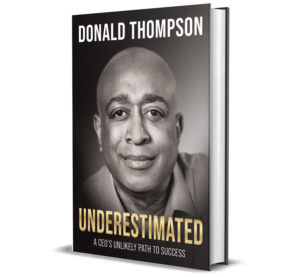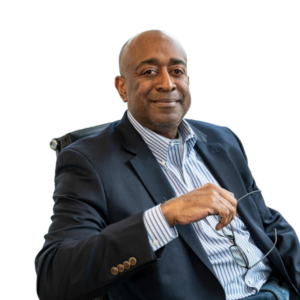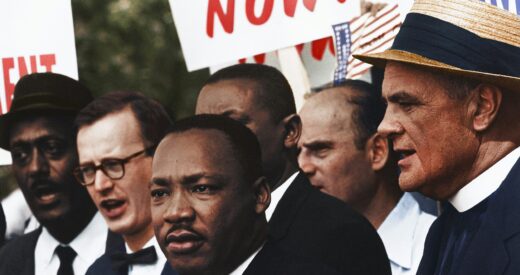Donald Thompson, co-founder and CEO of The Diversity Movement, is an entrepreneur, public speaker, podcaster, and executive coach. He is also the son of parents from Bogalusa, Louisiana, who raised their children to believe that they could achieve anything they set their minds to.
This confidence and a thirst for knowledge enabled Don to realize his dream of becoming a successful chief executive officer and entrepreneur. Along the way, he drew on lessons his parents instilled – the power of education, hard work, and a commitment to excellence – and those learned from his own mistakes. In Underestimated: A CEO’s Unlikely Path to Success, Don shares his story in the hope that it will inspire “folks who maybe don’t have a traditional pedigree of what success looks like,” he says.
We sat down recently with Don to talk about the book and what he has learned so far about persistence, achievement, and how to keep dreaming big.
What prompted you to write Underestimated?
 First, I wanted to honor my family: my parents, my Granny – my grandfather Big Daddy, in particular. They created a foundation for me – of love, care, excellence, and competitiveness – so I could go out into this world and win, in spite of the circumstances. If you think about the CEOs you’ve met or at companies you’ve worked for, how many of them have looked like me? The answer is likely very few.
First, I wanted to honor my family: my parents, my Granny – my grandfather Big Daddy, in particular. They created a foundation for me – of love, care, excellence, and competitiveness – so I could go out into this world and win, in spite of the circumstances. If you think about the CEOs you’ve met or at companies you’ve worked for, how many of them have looked like me? The answer is likely very few.
I remember my grandfather telling me that I was going to be the first millionaire in our family; I was maybe 8 years old. At the time, I didn’t understand what that meant, why it mattered, or why he was telling me that. But there was this belief, from that young age, that I could win with the cards that I was dealt.
Second, I hope to inspire people who have yet to make their mark in the world. You can not have a college degree and still make it. You could start out in one career and pivot; you can have some personal ups and downs. Your current circumstances don’t determine the size of your dream. Your current circumstances don’t determine what you can accomplish.
And third, from a business standpoint, I want to build a brand to grow The Diversity Movement, to grow the executive coaching that I do, and the leadership opportunities I’m pursuing. I want to create a foundation so people can get to know me, even if we haven’t spent time together.
When did you realize you’d “made it,” in terms of achieving your dreams?
I don’t think in terms of having “made it.” Have I done a few things that have worked out well? Absolutely. But I’m always chasing what’s next. I think my hunger for the next challenge doesn’t allow me to think about whether I’ve made it or not. It’s really more, “Do I have tools now so I can make a bigger and broader impact?” The answer to that is yes.
Have I made it? No. But have I gotten to a point where I can see further faster, because of some things that I’ve done and accomplished? Absolutely. I’ve reached the point in my career where my focus is shifting more from myself to others – that’s a sign of growth and maturity. It’s pretty cool in terms of the way you set goals, and the way you live your life and get up every day. I get to choose what I work on and who I work with. That’s pretty awesome.
When were you able to use money as a tool, rather than having it control you?
One thing about money is having a little bit extra creates a different set of choices. When I got out of debt from mistakes in my young adulthood and had a little money in savings, I became a different employee. When you’re working to live, you put up with different things versus when you work to achieve and learn and build capabilities. When I started to work to build capabilities with people who I enjoyed and respected, that was a beautiful thing.
That was about 15 years ago, because I didn’t have a big car or a house I couldn’t afford. Every time I got a commission check, I paid my bills, and there was some extra. And that was a good thing, because that gave me the power to make sure I was doing things that aligned with my values. I wanted to spend time chasing dreams and goals that were meaningful to me. A lot of times people think: When I’m a millionaire, when I have $10 million, or when I have this big house. But, it’s really when you get your finances in balance that you have the freedom of choice.
What is your advice to young professionals or would-be entrepreneurs?
 A lot of times people don’t start businesses, because they can’t afford to go without a paycheck for a month, two months, six months, a year, but they have this big dream or vision. Most people don’t have the opportunity to chase future rewards, because they’re chasing what they’ve got to do to pay the light bill and the mortgage.
A lot of times people don’t start businesses, because they can’t afford to go without a paycheck for a month, two months, six months, a year, but they have this big dream or vision. Most people don’t have the opportunity to chase future rewards, because they’re chasing what they’ve got to do to pay the light bill and the mortgage.
My advice to people on the way up is this: Anything you can do to keep your expenses down is going to keep your choices up. The higher your expenses, the fewer choices you have, because you’re locked into a lot of financial obligations. The smaller your financial expense footprint, the more choices you have about what you can do and what you can chase.
Sadly, what you will read in Underestimated is that I didn’t learn this right away. My early lessons were how to get out of debt and overcome bad credit. I did a whole series of things that I now tell people not to do from a financial perspective. I learned the hard way. I didn’t read books on financial planning; I lived through a historical amount of dumb decisions. But by doing that, those lessons created a foundation for better decisions in the future.
I have had the opportunity to chase new dreams, even though the profits might be deferred. That doesn’t mean I don’t want to make money, but it means that I can chase big opportunities, and the money can come later. The more you can defer your personal gain, the more personal gain there will be in the future.
Now, when I think about business, when I think about growth, when I think about things that I do day-to-day, finances are a factor, but they’re not the number one consideration. Instead, I can ask: What is the mission? Who are the people involved? What is the goal?
Discover more advice from Donald Thompson in Underestimated: A CEO’s Unlikely Path to Success, available October 11.
Amber Keister is a Content Writer and Editor at The Diversity Movement. She has spent more than 20 years as a journalist for publications throughout the South. Connect with her on Linkedin.






